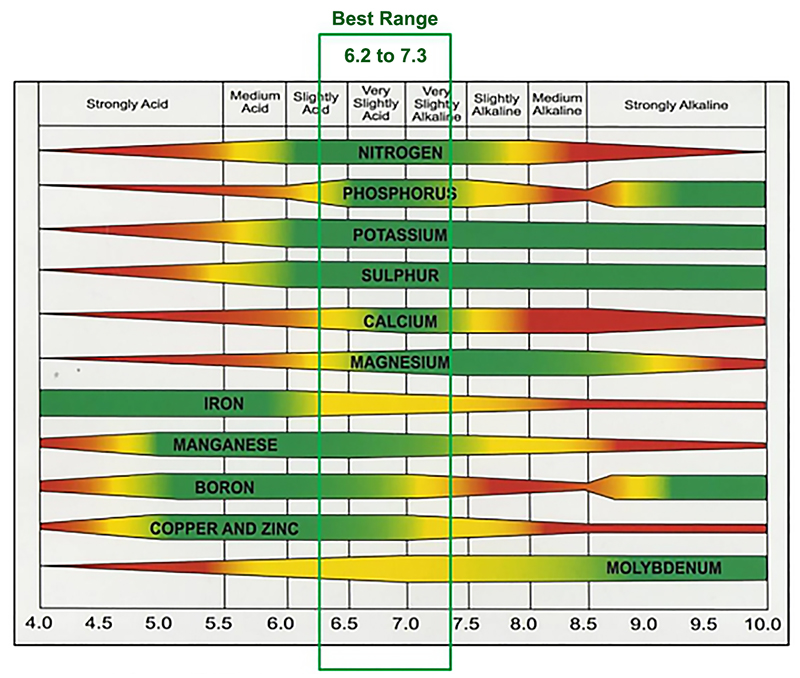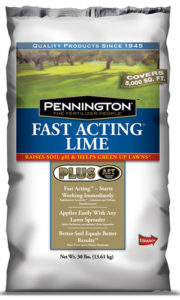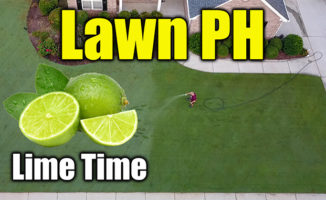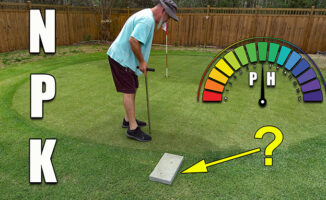Lawn soil PH testing and treatments are the one test that home owners should do every year. Your lawn soil PH can restrict the nutrients in your soil from being used by your grass, but there is a GOOD balance point you must understand. Product links in the video are below.
Best soil PH (Roughly)
Zoysia 6.0 to 7.0
Bermuda 6.0 to 7.0 (Ideal is 6.3)
Fescue 6.5 to 7.0
Centipede 5.0 to 6.0
Plants experience pH through their roots. The substrate is a mixture of water with dissolved nutrients, air and solid particles. Root hairs experience any changes that occur in this environment, such as variations in moisture, air, or concentrations of solutes in the substrate solution. Roots are very sensitive to pH. The acidity or basicity of the substrate solution determines how well the roots can take up nutrients and how well the plant can grow.
Below… see how PH impacts the availability of nutrients to you lawn.

← Click to order
Super Juice lawn fertilizer.
NOTE… These will often sell out of stock, so come back and check.
← Click to order
PH Meter
Runs about $70 – $80
← Click to order
Liquid Calcium
Small bottle is about $26
← Click to order
Large capacity spreader used.
Cost is roughly $173
Very good spreader.
← Click to order
Soil test kit that Doc uses.
About $70
This is the granular lime Doc uses in the video.
You can get at most Home Depots or Lowes.
More…
Soil pH affects turfgrass health by influencing availability of plant nutrients and other elements, thatch decomposition, some turfgrass pests, and pesticide activity. Strongly acid soils (pH less than or equal to 5.5) may lead to deficiencies in calcium, magnesium, or phosphorus and increase availability of aluminum and manganese in amounts that may be toxic to turf grasses. Liming improves plant nutrient availability and reduces toxicity problems in acid soils.
In strongly alkaline soils (pH greater than or equal to 8.5), the formation of insoluble tricalcium phosphate makes the phosphorus unavailable to the plant. Iron chlorosis, an indication of iron deficiency, may be seen on some plants growing in soils high in pH. Since most soils in Pennsylvania are not strongly alkaline, these types of deficiencies are not often encountered. Exceptions may occur when too much lime is applied to established turf or to the soil prior to planting.
Many beneficial soil microorganisms do not thrive in strongly acid soils. Some of these microorganisms break-down certain nitrogen fertilizers, thereby releasing the nitrogen for use by the turfgrass. Fertilizers containing nitrogen from ureaform, sulfur-coated urea, or natural organic sources are not effective unless certain microorganisms are present in sufficient quantities.
Soil microorganisms also aid in the decomposition of thatch and grass clippings. Thatch is the dense accumulation of organic material on the soil surface beneath the grass. A thatch layer restricts movement of air, water, nutrients, and pesticides into the soil. Soil pH in the range of 6.0 to 7.0 increases microbial activity and helps reduce thatch.
Acidic soils create conditions that favor growth of certain weed species. One of the most common and difficult-to-control weeds, moss, in more prevalent in moderately to strongly acidic soils than in neutral soils or slightly acid soils. Shepherds purse is a lawn weed that is a good indicator of moderately to strongly acidic soils. Although weeds cannot be controlled with lime applications, applying lime before soils become too acid is one means of preventing severe weed infestation.
Research has shown that the activity of some pesticides is influenced by soil pH. Strongly acid soils can reduce the effectiveness of some turfgrass herbicides and insecticides.









